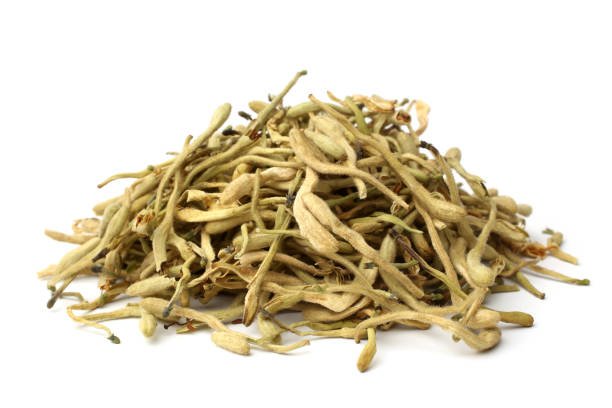In traditional Chinese medicine, Lonicera japonica is known as “Jin Yin Hua” and is considered to have cooling and detoxifying properties. It is commonly used to treat various health conditions, including respiratory infections, fevers, sore throat, and skin infections.
The main active compounds found in Lonicera japonica are chlorogenic acid, luteolin, and quercetin. These compounds have been found to possess antioxidant, anti-inflammatory, and antimicrobial properties. They may help boost the immune system, reduce inflammation, and fight against harmful bacteria and viruses.
There have been several studies conducted on Lonicera japonica (Jin Yin Hua) and its potential health benefits. Here are some key findings from scientific research:
- 1. Antioxidant activity: Lonicera japonica has been found to possess significant antioxidant activity. Studies have shown that the plant extract can scavenge free radicals and protect against oxidative stress, which is associated with various chronic diseases.
- 2. Anti-inflammatory effects: The active compounds in Lonicera japonica, such as chlorogenic acid and luteolin, have been found to exhibit anti-inflammatory properties. They can inhibit the production of pro-inflammatory molecules and reduce inflammation in various tissues and organs.
- 3. Antimicrobial activity: Lonicera japonica has been shown to have antimicrobial effects against a wide range of bacteria, fungi, and viruses. It can inhibit the growth of pathogens and help prevent infections.
- 4. Immunomodulatory effects: Some studies suggest that Lonicera japonica can modulate the immune system and enhance immune responses. It may help stimulate the production of immune cells and improve immune function.
- 5. Anti-cancer potential: Preliminary studies have indicated that Lonicera japonica extracts may have anti-cancer properties. They can inhibit the growth and proliferation of cancer cells and induce apoptosis (programmed cell death) in certain types of cancer.
- 6. Skin health benefits: Lonicera japonica extracts have been used in skincare products due to their potential benefits for the skin. They can help reduce inflammation, protect against UV-induced damage, and promote wound healing.
It is important to note that while these studies suggest potential health benefits of Lonicera japonica, more research is needed to fully understand its mechanisms of action and therapeutic applications. Additionally, the dosage, preparation, and safety of using Lonicera japonica should be carefully considered, and it is always recommended to consult with a healthcare professional before using any herbal remedies.
To make Jin Yin Hua tea, you will need the following ingredients:
– 1 tablespoon of dried Jin Yin Hua flowers or 2-3 fresh Jin Yin Hua flowers
– 1 cup of water
Here’s a simple method to prepare Jin Yin Hua tea:
1. Rinse the Jin Yin Hua flowers under running water to remove any dirt or impurities.
2. If using dried flowers, place them in a tea infuser or a teapot. If using fresh flowers, you can directly add them to the teapot.
3. Boil the water in a kettle or saucepan.
4. Pour the boiling water over the Jin Yin Hua flowers in the teapot.
5. Let the tea steep for about 5-10 minutes to allow the flavors and beneficial compounds to infuse into the water.
6. After steeping, strain the tea to remove the flowers.
7. You can enjoy the Jin Yin Hua tea as is, or you can add honey or lemon for added flavor.
Note: The steeping time can be adjusted according to your preference. You can steep the tea for a shorter time if you prefer a milder flavor or a longer time for a stronger taste. Additionally, you can adjust the amount of Jin Yin Hua flowers based on your desired strength of the tea.

